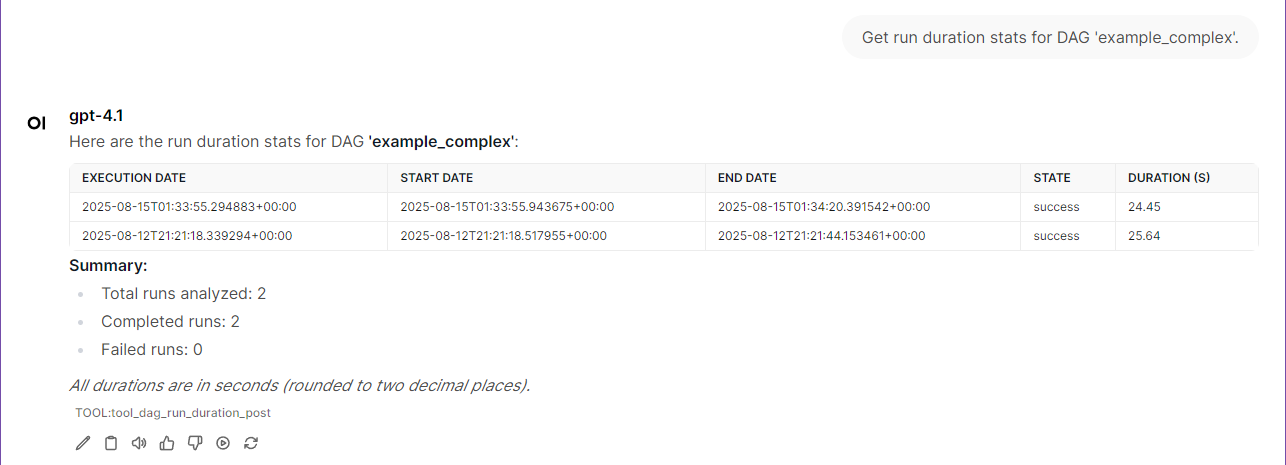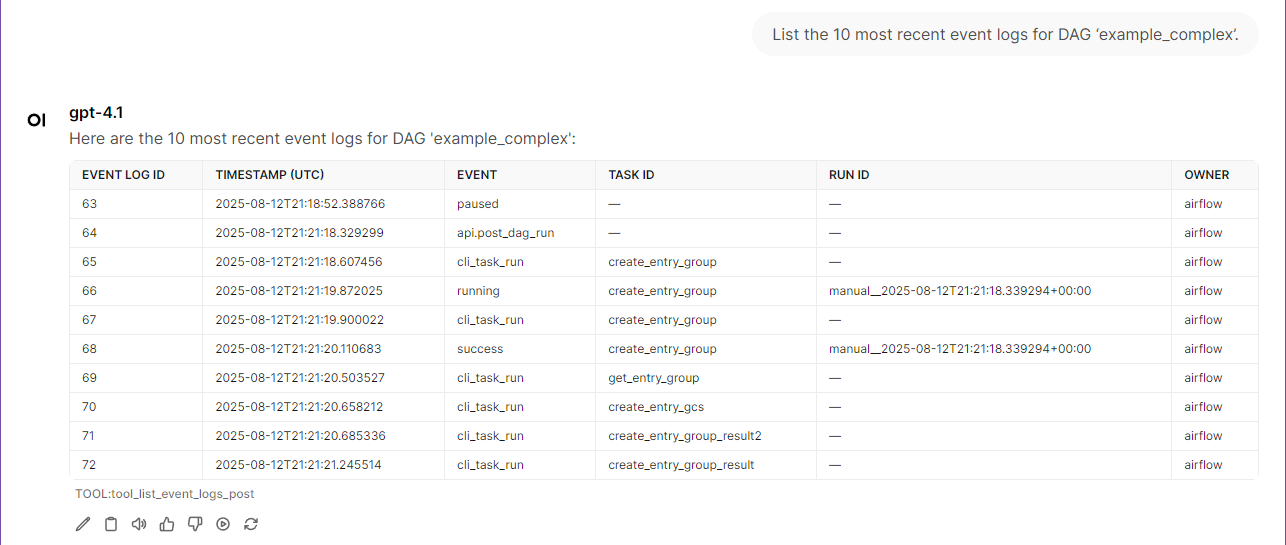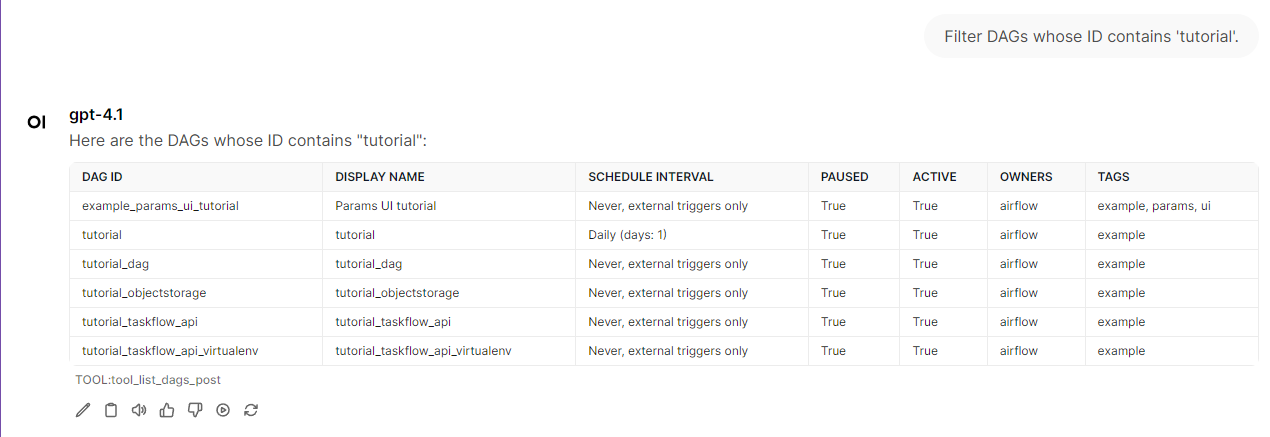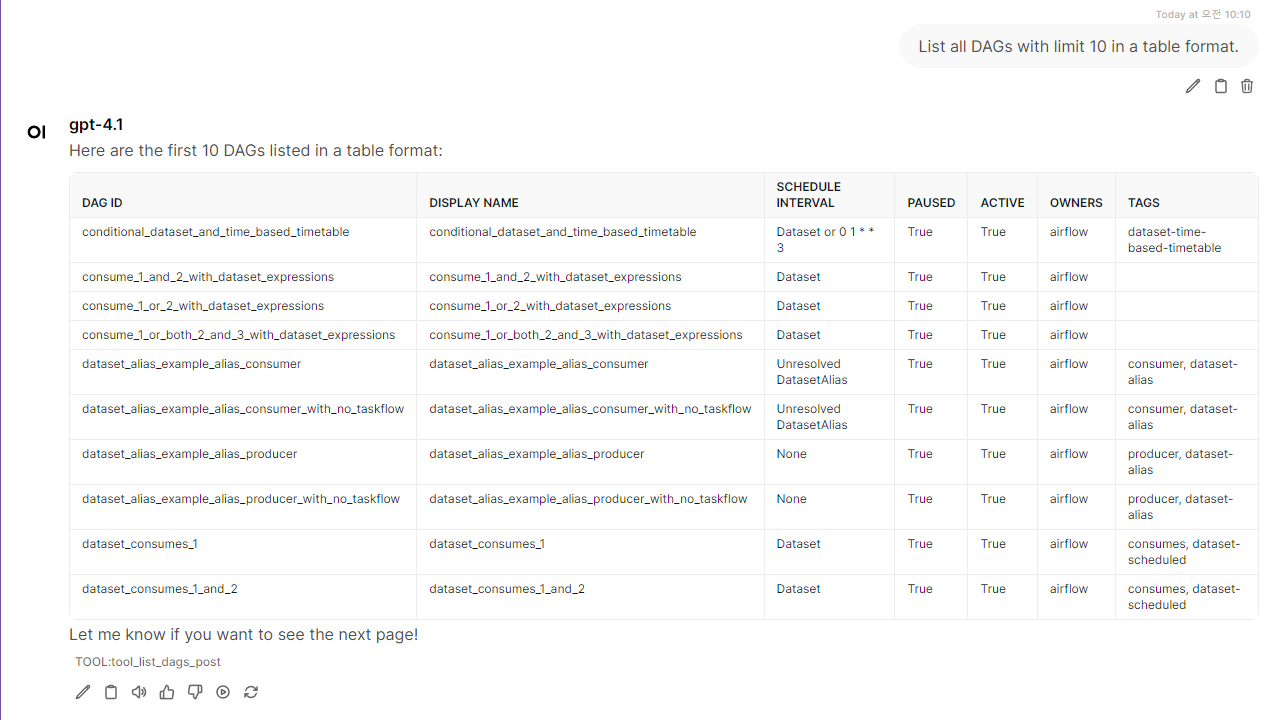The MCP-Airflow-API server is a Model Context Protocol (MCP) server that enables natural language monitoring and management of Apache Airflow clusters through LLM integration, translating Airflow REST API operations into intuitive tools.
Core Capabilities: • Natural Language Integration - Query Airflow using plain English and seamlessly integrate with LLMs • Comprehensive Monitoring - Access real-time cluster health, DAG status, performance analytics, and execution details • DAG Management - List, trigger, pause/unpause DAGs; retrieve running/failed runs, source code, and dependency graphs • Task Instance Management - Filter and retrieve task instances, access logs, extra links, and execution details • Resource Management - Manage Airflow pools, variables, connections, and XCom entries with full CRUD operations • Performance Analysis - Analyze DAG run durations, task execution times, and retrieve schedule information • Event & Error Tracking - Access event logs, import errors, and summary statistics across all DAGs • System Health - Check Airflow webserver health status and version information • Developer Tools - Access prompt templates for effective tool selection, paginated responses for large environments, and Docker integration for containerized deployment
Provides comprehensive monitoring and management of Apache Airflow clusters through natural language queries, including DAG inspection, task monitoring, health checks, cluster analytics, pool management, variable management, XCom operations, and event logging without requiring direct API complexity.
Click on "Install Server".
Wait a few minutes for the server to deploy. Once ready, it will show a "Started" state.
In the chat, type
@followed by the MCP server name and your instructions, e.g., "@MCP-Airflow-APIshow me currently running DAGs"
That's it! The server will respond to your query, and you can continue using it as needed.
Here is a step-by-step guide with screenshots.
🚀 MCP-Airflow-API
Revolutionary Open Source Tool for Managing Apache Airflow with Natural Language
Architecture & Internal (DeepWiki)
Related MCP server: airflow-mcp-server
📋 Overview
Have you ever wondered how amazing it would be if you could manage your Apache Airflow workflows using natural language instead of complex REST API calls or web interface manipulations? MCP-Airflow-API is the revolutionary open-source project that makes this goal a reality.
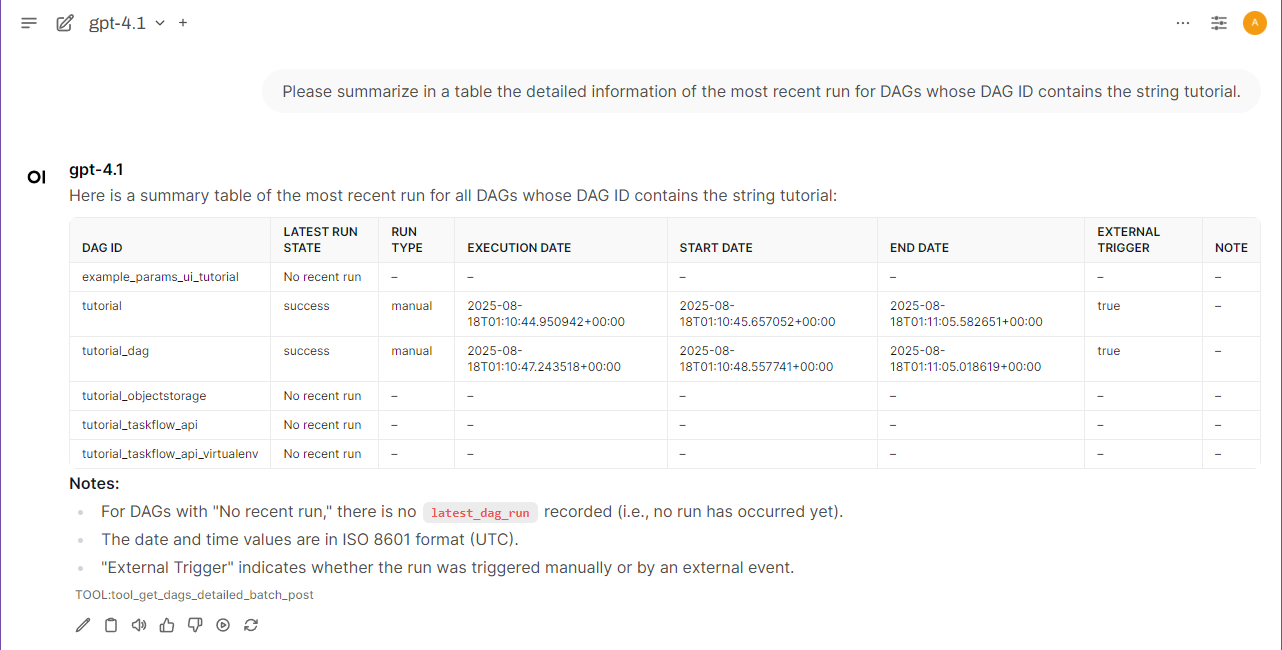
🎯 What is MCP-Airflow-API?
MCP-Airflow-API is an MCP server that leverages the Model Context Protocol (MCP) to transform Apache Airflow REST API operations into natural language tools. This project hides the complexity of API structures and enables intuitive management of Airflow clusters through natural language commands.
🆕 Multi-Version API Support (NEW!)
Now supports both Airflow API v1 (2.x) and v2 (3.0+) with dynamic version selection via environment variable:
API v1: Full compatibility with Airflow 2.x clusters (43 tools) - Documentation
API v2: Enhanced features for Airflow 3.0+ including asset management for data-aware scheduling (45 tools) - Documentation
Key Architecture: Single MCP server with shared common tools (43) plus v2-exclusive asset tools (2) - dynamically loads appropriate toolset based on AIRFLOW_API_VERSION environment variable!
Traditional approach (example):
MCP-Airflow-API approach (natural language):
"Show me the currently running DAGs"
🚀 Quickstart
📝 Need a test Airflow cluster? Use our companion project Airflow-Docker-Compose with support for both Airflow 2.x and Airflow 3.x environments!
Flow Diagram of Quickstart/Tutorial
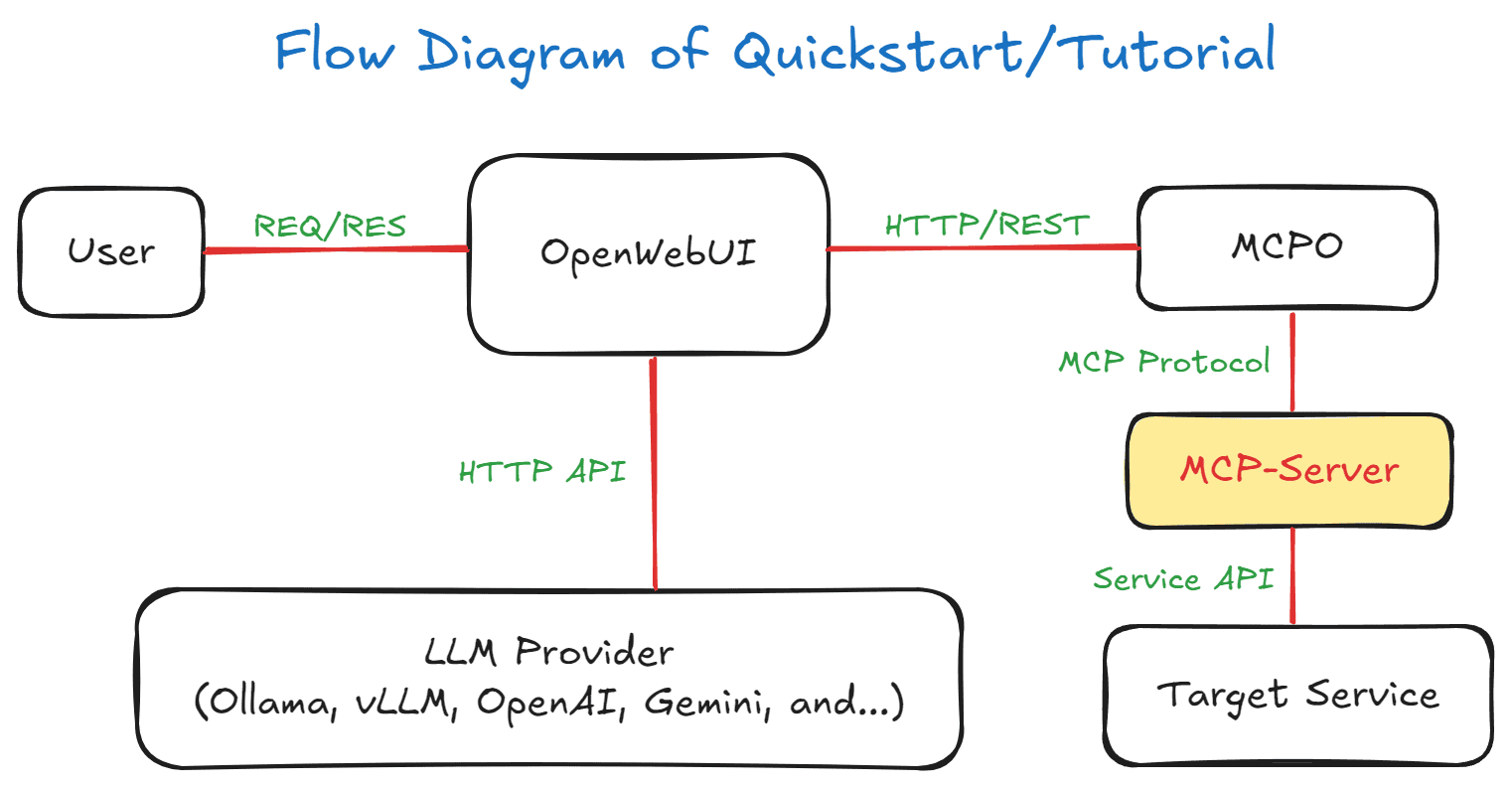
🎯 Recommended: Docker Compose (Complete Demo Environment)
For quick evaluation and testing:
Getting Started with OpenWebUI (Docker Option)
📌 Note: Web-UI configuration instructions are based on OpenWebUI v0.6.22. Menu locations and settings may differ in newer versions.
Access http://localhost:3002/
Log in with admin account
Go to "Settings" → "Tools" from the top menu
Add Tool URL:
http://localhost:8002/airflow-apiConfigure your LLM provider (Ollama, OpenAI, etc.)
📦 MCP Server Installation Methods
Method 1: Direct Installation from PyPI
Method 2: Claude-Desktop MCP Client Integration
Local Access (stdio mode)
Remote Access (streamable-http mode without authentication)
Remote Access (streamable-http mode with Bearer token authentication - Recommended)
Multiple Airflow Clusters with Different Versions
💡 Pro Tip: Use the test clusters from Airflow-Docker-Compose for the above configuration - they run on ports 38080 (2.x) and 48080 (3.x) respectively!
Method 3: Development Installation
🌟 Key Features
Natural Language Queries
No need to learn complex API syntax. Just ask as you would naturally speak:"What DAGs are currently running?"
"Show me the failed tasks"
"Find DAGs containing ETL"
Comprehensive Monitoring Capabilities
Real-time cluster status monitoring:Cluster health monitoring
DAG status and performance analysis
Task execution log tracking
XCom data management
Dynamic API Version Support
Single MCP server adapts to your Airflow version:API v1: 43 shared tools for Airflow 2.x compatibility
API v2: 43 shared tools + 2 asset management tools for Airflow 3.0+
Environment Variable Control: Switch versions instantly with
AIRFLOW_API_VERSIONZero Configuration Changes: Same tool names, enhanced capabilities
Efficient Architecture: Shared common codebase eliminates duplication
Comprehensive Tool Coverage
Covers almost all Airflow API functionality:DAG management (trigger, pause, resume)
Task instance monitoring
Pool and variable management
Connection configuration
Configuration queries
Event log analysis
Large Environment Optimization
Efficiently handles large environments with 1000+ DAGs:Smart pagination support
Advanced filtering options
Batch processing capabilities
🛠️ Technical Advantages
Leveraging Model Context Protocol (MCP)
MCP is an open standard for secure connections between AI applications and data sources, providing:Standardized interface
Secure data access
Scalable architecture
Support for Two Transport Modes
stdiomode: Direct MCP client integration for local environmentsstreamable-httpmode: HTTP-based deployment for Docker and remote access
Environment Variable Control:
FASTMCP_TYPE=stdio # Default: Direct MCP client mode FASTMCP_TYPE=streamable-http # Docker/HTTP mode FASTMCP_PORT=8000 # HTTP server port (Docker internal)Comprehensive Airflow API Coverage
Full implementation of official Airflow REST APIs:API v1 Support: Based on Airflow 2.x REST API
API v2 Support: Based on Airflow 3.0+ REST API
Dynamic Version Selection: Runtime switching between API versions
Feature Parity: Complete endpoint coverage for both versions
Complete Docker Support
Full Docker Compose setup with 3 separate services:Open WebUI: Web interface (port
3002)MCP Server: Airflow API tools (internal port
8000, exposed via18002)MCPO Proxy: REST API endpoint provider (port
8002)
Use Cases in Action
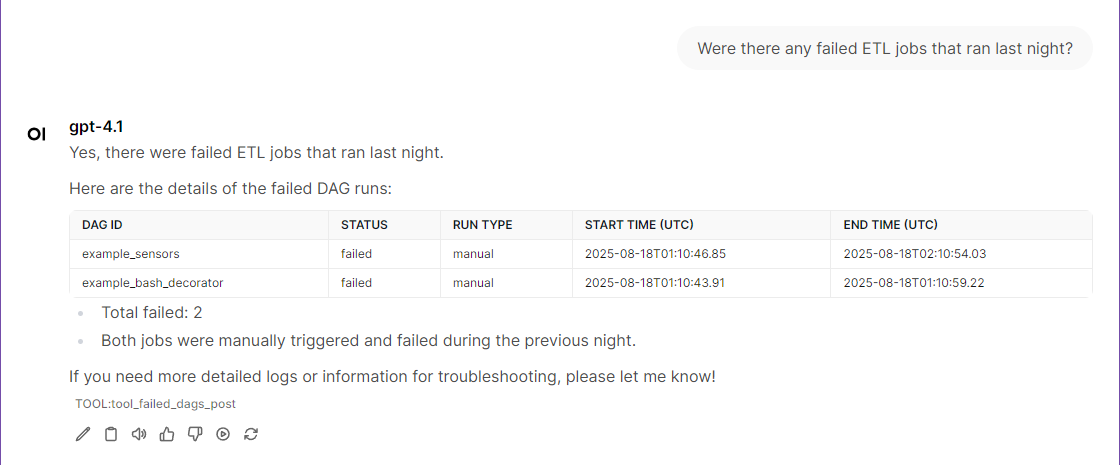
⚙️ Advanced Configuration
Environment Variables
API Version Comparison
Official Documentation:
API v1: Airflow 2.x REST API Reference
API v2: Airflow 3.0+ REST API Reference
Feature | API v1 (Airflow 2.x) | API v2 (Airflow 3.0+) |
Total Tools | 43 tools | 45 tools |
Shared Tools | 43 (100%) | 43 (96%) |
Exclusive Tools | 0 | 2 (Asset Management) |
Basic DAG Operations | ✅ | ✅ Enhanced |
Task Management | ✅ | ✅ Enhanced |
Connection Management | ✅ | ✅ Enhanced |
Pool Management | ✅ | ✅ Enhanced |
Asset Management | ❌ | ✅ New |
Asset Events | ❌ | ✅ New |
Data-Aware Scheduling | ❌ | ✅ New |
Enhanced DAG Warnings | ❌ | ✅ New |
Advanced Filtering | Basic | ✅ Enhanced |
🔐 Security & Authentication
Bearer Token Authentication
For streamable-http mode, this MCP server supports Bearer token authentication to secure remote access. This is especially important when running the server in production environments.
Configuration
Enable Authentication:
Or via CLI:
Security Levels
stdio mode (Default): Local-only access, no authentication needed
streamable-http + REMOTE_AUTH_ENABLE=false: Remote access without authentication ⚠️ NOT RECOMMENDED for production
streamable-http + REMOTE_AUTH_ENABLE=true: Remote access with Bearer token authentication ✅ RECOMMENDED for production
Note:
REMOTE_AUTH_ENABLEdefaults tofalsewhen undefined, empty, or null. Supported values aretrue/false,1/0,yes/no,on/off(case insensitive).
Client Configuration
When authentication is enabled, MCP clients must include the Bearer token in the Authorization header:
Security Best Practices
Always enable authentication when using streamable-http mode in production
Use strong, randomly generated secret keys (32+ characters recommended)
Use HTTPS when possible (configure reverse proxy with SSL/TLS)
Restrict network access using firewalls or network policies
Rotate secret keys regularly for enhanced security
Monitor access logs for unauthorized access attempts
Error Handling
When authentication fails, the server returns:
401 Unauthorized for missing or invalid tokens
Detailed error messages in JSON format for debugging
Custom Docker Compose Setup
Development Installation
🧪 Test Airflow Cluster Deployment
For testing and development, use our companion project Airflow-Docker-Compose which supports both Airflow 2.x and 3.x environments.
Quick Setup
Clone the test environment repository:
git clone https://github.com/call518/Airflow-Docker-Compose.git cd Airflow-Docker-Compose
Option 1: Deploy Airflow 2.x (LTS)
For testing API v1 compatibility with stable production features:
Environment details:
Image:
apache/airflow:2.10.2Port:
38080(configurable viaAIRFLOW_WEBSERVER_PORT)API:
/api/v1/*endpointsAuthentication: Basic Auth
Use case: Production-ready, stable features
Option 2: Deploy Airflow 3.x (Latest)
For testing API v2 with latest features including Assets management:
Environment details:
Image:
apache/airflow:3.0.6Port:
48080(configurable viaAIRFLOW_APISERVER_PORT)API:
/api/v2/*endpoints + Assets managementAuthentication: JWT Token (FabAuthManager)
Use case: Development, testing new features
Option 3: Deploy Both Versions Simultaneously
For comprehensive testing across different Airflow versions:
Key Differences
Feature | Airflow 2.x | Airflow 3.x |
Authentication | Basic Auth | JWT Tokens (FabAuthManager) |
Default Port | 38080 | 48080 |
API Endpoints |
|
|
Assets Support | ❌ Limited/Experimental | ✅ Full Support |
Provider Packages | providers | distributions |
Stability | ✅ Production Ready | 🧪 Beta/Development |
Cleanup
To stop and clean up the test environments:
🌈 Future-Ready Architecture
Scalable design and modular structure for easy addition of new features
Standards-compliant protocol for integration with other tools
Cloud-native operations and LLM-ready interface
Context-aware query processing and automated workflow management capabilities
🎯 Who Is This Tool For?
Data Engineers — Reduce debugging time, improve productivity, minimize learning curve
DevOps Engineers — Automate infrastructure monitoring, reduce incident response time
System Administrators — User-friendly management without complex APIs, real-time cluster status monitoring
🚀 Open Source Contribution and Community
Repository: https://github.com/call518/MCP-Airflow-API
How to Contribute
Bug reports and feature suggestions
Documentation improvements
Code contributions
Please consider starring the project if you find it useful.
🔮 Conclusion
MCP-Airflow-API changes the paradigm of data engineering and workflow management:
No need to memorize REST API calls — just ask in natural language:
"Show me the status of currently running ETL jobs."
🏷️ Tags
#Apache-Airflow #MCP #ModelContextProtocol #DataEngineering #DevOps #WorkflowAutomation #NaturalLanguage #OpenSource #Python #Docker #AI-Integration
📚 Example Queries & Use Cases
This section provides comprehensive examples of how to use MCP-Airflow-API tools with natural language queries.
Basic DAG Operations
list_dags: "List all DAGs with limit 10 in a table format." → Returns up to 10 DAGs
list_dags: "List all DAGs a table format." → Returns up to All DAGs (WARN: Need High Tokens)
list_dags: "Show next page of DAGs." → Use offset for pagination
list_dags: "List DAGs 21-40." →
list_dags(limit=20, offset=20)list_dags: "Filter DAGs whose ID contains 'tutorial'." →
list_dags(id_contains="etl")list_dags: "Filter DAGs whose display name contains 'tutorial'." →
list_dags(name_contains="daily")get_dags_detailed_batch: "Get detailed information for all DAGs with execution status." →
get_dags_detailed_batch(fetch_all=True)get_dags_detailed_batch: "Get details for active, unpaused DAGs with recent runs." →
get_dags_detailed_batch(is_active=True, is_paused=False)get_dags_detailed_batch: "Get detailed info for DAGs containing 'example' with run history." →
get_dags_detailed_batch(id_contains="example", limit=50)running_dags: "Show running DAGs."
failed_dags: "Show failed DAGs."
trigger_dag: "Trigger DAG 'example_complex'."
pause_dag: "Pause DAG 'example_complex' in a table format."
unpause_dag: "Unpause DAG 'example_complex' in a table format."
Cluster Management & Health
get_health: "Check Airflow cluster health."
get_version: "Get Airflow version information."
Pool Management
list_pools: "List all pools."
list_pools: "Show pool usage statistics."
get_pool: "Get details for pool 'default_pool'."
get_pool: "Check pool utilization."
Variable Management
list_variables: "List all variables."
list_variables: "Show all Airflow variables with their values."
get_variable: "Get variable 'database_url'."
get_variable: "Show the value of variable 'api_key'."
Task Instance Management
list_task_instances_all: "List all task instances for DAG 'example_complex'."
list_task_instances_all: "Show running task instances."
list_task_instances_all: "Show task instances filtered by pool 'default_pool'."
list_task_instances_all: "List task instances with duration greater than 300 seconds."
list_task_instances_all: "Show failed task instances from last week."
list_task_instances_all: "List failed task instances from yesterday."
list_task_instances_all: "Show task instances that started after 9 AM today."
list_task_instances_all: "List task instances from the last 3 days with state 'failed'."
get_task_instance_details: "Get details for task 'data_processing' in DAG 'example_complex' run 'scheduled__xxxxx'."
list_task_instances_batch: "List failed task instances from last month."
list_task_instances_batch: "Show task instances in batch for multiple DAGs from this week."
get_task_instance_extra_links: "Get extra links for task 'data_processing' in latest run."
get_task_instance_logs: "Retrieve logs for task 'create_entry_gcs' try number 2 of DAG 'example_complex'."
XCom Management
list_xcom_entries: "List XCom entries for task 'data_processing' in DAG 'example_complex' run 'scheduled__xxxxx'."
list_xcom_entries: "Show all XCom entries for task 'data_processing' in latest run."
get_xcom_entry: "Get XCom entry with key 'result' for task 'data_processing' in specific run."
get_xcom_entry: "Retrieve XCom value for key 'processed_count' from task 'data_processing'."
Configuration Management
get_config: "Show all Airflow configuration sections and options." → Returns complete config or 403 if expose_config=False
list_config_sections: "List all configuration sections with summary information."
get_config_section: "Get all settings in 'core' section." →
get_config_section("core")get_config_section: "Show webserver configuration options." →
get_config_section("webserver")search_config_options: "Find all database-related configuration options." →
search_config_options("database")search_config_options: "Search for timeout settings in configuration." →
search_config_options("timeout")
Important: Configuration tools require expose_config = True in airflow.cfg [webserver] section. Even admin users get 403 errors if this is disabled.
DAG Analysis & Monitoring
get_dag: "Get details for DAG 'example_complex'."
get_dags_detailed_batch: "Get comprehensive details for all DAGs with execution history." →
get_dags_detailed_batch(fetch_all=True)get_dags_detailed_batch: "Get details for active DAGs with latest run information." →
get_dags_detailed_batch(is_active=True)get_dags_detailed_batch: "Get detailed info for ETL DAGs with recent execution data." →
get_dags_detailed_batch(id_contains="etl")
Note: get_dags_detailed_batch returns each DAG with both configuration details (from get_dag()) and a latest_dag_run field containing the most recent execution information (run_id, state, execution_date, start_date, end_date, etc.).
dag_graph: "Show task graph for DAG 'example_complex'."
list_tasks: "List all tasks in DAG 'example_complex'."
dag_code: "Get source code for DAG 'example_complex'."
list_event_logs: "List event logs for DAG 'example_complex'."
list_event_logs: "Show event logs with ID from yesterday for all DAGs."
get_event_log: "Get event log entry with ID 12345."
all_dag_event_summary: "Show event count summary for all DAGs."
list_import_errors: "List import errors with ID."
get_import_error: "Get import error with ID 67890."
all_dag_import_summary: "Show import error summary for all DAGs."
dag_run_duration: "Get run duration stats for DAG 'example_complex'."
dag_task_duration: "Show latest run of DAG 'example_complex'."
dag_task_duration: "Show task durations for latest run of 'manual__xxxxx'."
dag_calendar: "Get calendar info for DAG 'example_complex' from last month."
dag_calendar: "Show DAG schedule for 'example_complex' from this week."
Date Calculation Examples
Tools automatically base relative date calculations on the server's current date/time:
User Input | Calculation Method | Example Format |
"yesterday" | current_date - 1 day | YYYY-MM-DD (1 day before current) |
"last week" | current_date - 7 days to current_date - 1 day | YYYY-MM-DD to YYYY-MM-DD (7 days range) |
"last 3 days" | current_date - 3 days to current_date | YYYY-MM-DD to YYYY-MM-DD (3 days range) |
"this morning" | current_date 00:00 to 12:00 | YYYY-MM-DDTHH:mm:ssZ format |
The server always uses its current date/time for these calculations.
Asset Management (API v2 Only)
Available only when AIRFLOW_API_VERSION=v2 (Airflow 3.0+):
list_assets: "Show all assets registered in the system." → Lists all data assets for data-aware scheduling
list_assets: "Find assets with URI containing 's3://data-lake'." →
list_assets(uri_pattern="s3://data-lake")list_asset_events: "Show recent asset events." → Lists when assets were created or updated
list_asset_events: "Show asset events for specific URI." →
list_asset_events(asset_uri="s3://bucket/file.csv")list_asset_events: "Find events produced by ETL DAGs." →
list_asset_events(source_dag_id="etl_pipeline")
Data-Aware Scheduling Examples:
"Show me which assets trigger the customer_analysis DAG."
"List all assets created by the data_ingestion DAG this week."
"Find assets that haven't been updated recently."
"Show the data lineage for our ML training pipeline."
Contributing
🤝 Got ideas? Found bugs? Want to add cool features?
We're always excited to welcome new contributors! Whether you're fixing a typo, adding a new monitoring tool, or improving documentation - every contribution makes this project better.
Ways to contribute:
🐛 Report issues or bugs
💡 Suggest new Airflow monitoring features
📝 Improve documentation
🚀 Submit pull requests
⭐ Star the repo if you find it useful!
Pro tip: The codebase is designed to be super friendly for adding new tools. Check out the existing @mcp.tool() functions in airflow_api.py.
🛠️ Adding Custom Tools (Advanced)
This MCP server is designed for easy extensibility. After you have explored the main features and Quickstart, you can add your own custom tools as follows:
Step-by-Step Guide
1. Add Helper Functions (Optional)
Add reusable data functions to src/mcp_airflow_api/functions.py:
2. Create Your MCP Tool
Add your tool function to src/mcp_airflow_api/airflow_api.py:
3. Update Imports (If Needed)
Add your helper function to imports in src/mcp_airflow_api/airflow_api.py:
4. Update Prompt Template (Recommended)
Add your tool description to src/mcp_airflow_api/prompt_template.md for better natural language recognition:
5. Test Your Tool
That's it! Your custom tool is ready to use with natural language queries.
License
Freely use, modify, and distribute under the MIT License.


